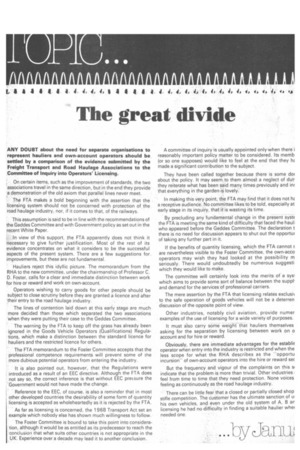The great divide
Page 102

If you've noticed an error in this article please click here to report it so we can fix it.
ANY DOUBT about the need for separate organisations to represent hauliers and own-account operators should be settled by a comparison of the evidence submitted by the Freight Transport and Road Haulage Associations to the Committee of Inquiry into Operators Licensing.
. On certain items, such as the improvement of standards, the two associations travel in the same direction, but in the end they provide .a demonstration of the old axiom that parallel lines never meet.
The FTA makes a bold beginning with the assertion that the licensing system should not be concerned with protection of the road haulage industry, nor, if it comes to that, of the railways.
This assumption is said to be in line with the recommendations of the Geddes Committee and with Government policy as set out in the recent White Paper.
In view of this support, the FTA apparently does not think it necessary to give further justification. Most of the rest of its evidence concentrates on what it considers to be the successful aspects of the present system. There are a few suggestions for improvements, but these are not fundamental Hauliers reject this idyllic picture. The memorandum from the R HA to the new committee, under the chairmanship of Professor C. D. Foster, calls for a clear and immediate distinction between work for hire or reward and work on own-account.
Operators wishing to carry goods for other people should be subject to close scrutiny before they are granted a licence and after their entry to the road haulage industry.
The lines of contention laid down at this early stage are much more decided than those which separated the two associations when they were putting their case to the Geddes Committee.
The warning by the FTA to keep off the grass has already been ignored in the Goods Vehicle Operators (Qualifications) Regulations, which make a distinction between the standard licence for hauliers and the restricted licence for others.
The FTA memorandum to the Foster Committee accepts that the professional competence requirements will prevent some of the more dubious potential operators from entering the industry.
It is also pointed out, however, that the Regulations were . introduced as a result of an EEC directive. Although the FTA does not say so, the correct inference is that without EEC pressure the 'Government would not have made the change.
Reference to the EEC, of course, is also a reminder that in most other developed countries the desirability of some form of quantity licensing is accepted as wholeheartedly as it is rejected by the FTA.
As far as licensing is concerned, the 1968 Transport Act set an example which nobody else has shown much willingness to follow.
The Foster Committee is bound to take this point into consideration, although it would be as entitled as its predecessor to reach the conclusion that what suits other countries is not appropriate in the UK. Experience over a decade may lead it to another conclusion. A committee of inquiry is usually appointed only when there i reasonably important policy matter to be considered. Its memb (or so one supposes) would like to feel at the end that they hE made a significant contribution to the subject.
They have been called together because there is some dot about the policy. It may seem to them almost a neglect of dur they reiterate what has been said many times previously and im that everything in the garden is lovely.
In making this very point, the FTA may find that it does not hE a receptive audience. No committee likes to be told, especially at early stage in its inquiry, that it is wasting its time.
By precluding any fundamental change in the present systE the FTA is meeting the same kind of difficulty that faced the hauli who appeared before the Geddes Committee. The declaration t there is no need for discussion appears to shut out the opportur of taking any further part in it.
If the benefits of quantity licensing, which the FTA cannot are nevertheless visible to the Foster Committee, the own-acco operators may wish they had looked at the possibility m seriously. There would undoubtedly be numerous suggesti which they would like to make.
The committee will certainly look into the merits of a sysi which aims to provide some sort of balance between the suppl: and demand for the services of professional carriers.
The mere assertion by the FTA that licensing relates exclusk to the safe operation of goods vehicles will not be a deterren discussion of the opposite point of view.
Other industries, notably civil aviation, provide numer examples of the use of licensing for a wide variety of purposes.
It must also carry some weight that hauliers themselves asking for the separation by licensing between work on o account and for hire or reward.
Obviously, there are immediate advantages for the establiE operator when entry into the industry is restricted and when the less scope for what the RHA describes as the opportu incursionof own-account operators into the hire or reward sec
But the frequency and vigour of the complaints on this si indicate that the problem is more than trivial. Other industries I feel from time to time that they need protection. None voices feeling as continuously as the road haulage industry.
There can be little fear that a closed or partially closed shop stifle competition. The customer has the ultimate sanction of u: his own vehicles, and even under the old system of A, B an licensing he had no difficulty in finding a suitable haulier wher needed one.
































































































































































